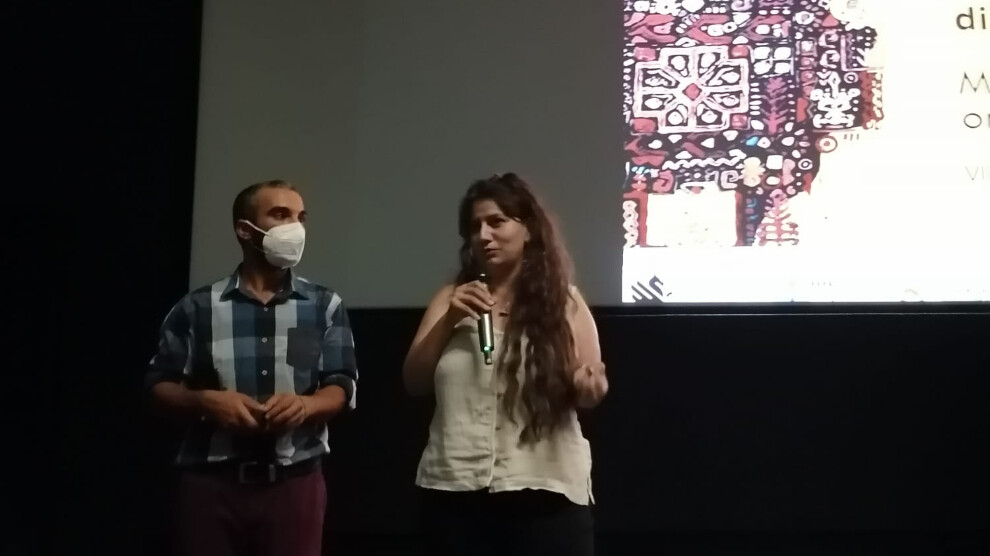Rewend, the Rojava Film Commune wandering festival, lands in Rome
Sevinaz Evdike, film director and head of the Rojava Film Commune, arrived in Rome to present the Kurdish wandering film project, Rewend.
Sevinaz Evdike, film director and head of the Rojava Film Commune, arrived in Rome to present the Kurdish wandering film project, Rewend.

Rewend is a project created by the Rojava Film Commune, Observatori Ovni and Streeen.org and sponsored by the Goteborg Film Fund aimed at promoting and distributing the production of movies made in Northern and Eastern Syria.
As its name reveals, Rewend (nomad) is a sort of nomadic festival, travelling around the Spanish state, Italy, France. On Tuesday and until 12 June, Rewend is in Rome, with a program of screenings and conversations.
The opening was at Cinema Quattro Fontane with Blackberry Season, a film by Hasim Aydemir. Yesterday the festival was at Cinema Madison where The Lonely Tree by Shero Hindi and Mal (Home) by Sevinaz Evdike were screened.
Today the Centro Sperimentale di Cinematografia will screen Ji Bo Azadiye (The end will be spectacular) by Ersin Celik and Mal at 3 pm, while at 7 pm at Scena, the latest film by Hindi, Love in the time of genocide, will be screened.
Last week, Rewend was in Madrid, hosted by Rojava Azadi. The Rojava Film Commune has produced several works in the past five years, despite the difficult conditions in which the main protagonists are people living in a territory besieged by terrorist groups such as the Islamic State and constantly under the attacks of the Turkish state.
Sevinaz Evdike spoke about what it is like to be a filmmaker in Rojava and to participate in the Commune, a space that is no stranger to the profound political and social transformations that have taken place in the north and east of Syria since 2012, when the population together with their self-defense forces declared the autonomy of the territory and began a resistance that, until now, could not be broken by the Islamic State, the Syrian regime or the Turkish government of Recep Tayyip Erdogan.
“The Rojava Film Commune, - said Evdike - in the beginning, did not start as an organization. Some filmmakers who were already making movies after the revolution, had the freedom to work. Many internationalists who came to Rojava and who participated in the struggle were also filmmakers. They did not come to make films, but to contribute to the revolution. And both groups started working together.”
That before and after that Sevinaz talks about has to do with the censorship of the Syrian regime. Although it was often filmed with the approval of the State, the final product never saw the light of day.
With the Rojava Film Commune running with barely 30 people, only five of whom were professionals, the challenges for a new Kurdish cinema were on the table. Sevinaz comes from a family of filmmakers and artists. She studied filmmaking in Diyarbakir, the historical capital of North Kurdistan. Before, she studied psychology for four years in the province of Deir Ezzor. But she was always clear that the cinema was the strongest drive that motivated her, not only professionally, but within the long centuries-old struggle that her town is carrying out.
"In the beginning, there were people from Rojava, Bakur (Turkish Kurdistan) and internationalists who got together," she said about the beginnings of the project. They made a statement, inviting young people who were interested in the subject. Three-month working groups were created. In July 2015, the Rojava Film Commune was proclaimed as such. There were known filmmakers and there were people who had never worked in film. And they all got together to create the Commune.”
The first objective in the Commune was "to teach and train", because "for 40 years, that work was prohibited for us. - said Evdike - The people who then worked clandestinely saw it as very important to have training in cinema. The second goal was to be able to spread our ideas and get people interested in cinema and watch movies.”
Currently, the Rojava Film Commune is divided into three groups working from the cities of Qamishlo, Kobane and Shehba, where the Afrin Film Commune relocated after the Turkish invasion of Afrin in 2018.
These days, the Commune continues to shoot a series of films, in which 150 people work in total. In each of its communes, there are between 25 and 30 fixed people with the most varied occupations.